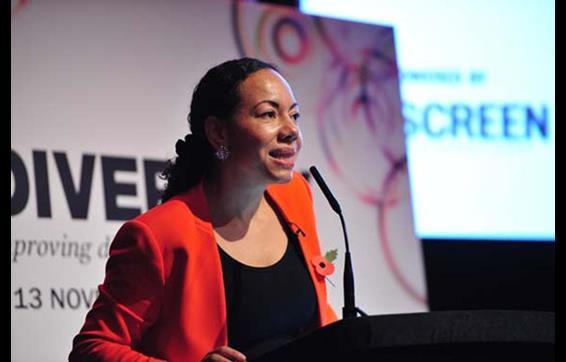
Last week (13th November), the Diversify conference took place at Bafta HQ in London. Hosted by Broadcast and Screen International, the event was a timely one off the back of the recent Creative Skillset report that highlighted a significant decline in the representation of BAME (black, Asian and minority ethnic) people in the industries between 2009 and 2012.
Attended by those both already working and apsiring to work in the television industry, the all-day conference discussed reasons why achieving better diversity results is still a struggle and what action needs to be taken. Please see below for a round up of comments (click the links to read the full articles via Broadcast).
Lenny Henry calls for racial quotas
Kwame Kwei-Armah: “In the UK, there’s very little diversity of the roles for men or women of colour, but in the US there’s a diversity of opportunity…I’m in a permanent state of maudlin that that one has to go to the States.”
Baroness Oona King: “accountability, access and affordability”. She said that it was important to create a baseline now in order to measure future progress. King made it clear that goodwill on its own was not enough and must be matched with real resource. “If you’re not going to attach resource then things aren’t going to change fast enough. We need to put money where our mouth is."
King also said one way to make producers accountable would be to make them honour the Creative Diversity Network diversity pledge. “We should say, if you’re not doing it, we’ll withhold the last 5% of your production payment. You can be sure that they would change then. And we have to resource the CDN properly to do that.”
“Once and for all we need to link the talent to the production…The industry needs to take responsibility to bring people together – a producer like Matthew who is looking for diverse members of his production team, and Simone who has a membership of 40,000. We’re wasting too much time and resources otherwise.”
Former BBC and Livity executive Derren Lawford: There needs to be an adjustment to recruitment policies: “If you make it performance related, so that senior executives don’t get their bonus if they don’t recruit X amount of people from minorities, I think people might perform better.”
104 Films co-founder Justin Edgar: The industry remains a closed shop for many people with disabilities: “Physical access remains the biggest problem: access to film sets, access to edit suites. We’ve spoken to the BFI about having to have a trainee from a diverse background on every film set.”
Former RTS chief executive Simon Albury: “There is no permanent organisation devoted to driving diversity. I’d like to suggest that the broadcasters and film industry finance such an organisation to kick this thing along,” he said.
Kate O’Connor, executive director of Creative Skillset: “We need to be clear about who is accountable for this agenda…who is responsible for making that change happen? We are one of those organisations…It would be good for other organisations and industry bodies to say the same.”
“We can’t expect people to get degrees. We have to have more apprentices, we have to pay our interns…And when people are in, we’ve got to develop them.”
Film London head of talent development and production Deborah Sathe: The BBC has a special responsibility. “It’s your duty with public money to represent the public. Take risks and be brave.”
The problem is that there is “a fear of getting it wrong when it comes to delivering new talent and new voices.”
There is too much knee-jerk, short-term thinking and too many three-year strategies that are moderately successful before being cut without considering their long-term impact.
Adil Ray, creator of Citizen Khan: “Refuse to look at it as an obstacle, it’s a challenge…There will always be a desire for more. There won’t be a moment when we say there’s enough black people, brown people, women, whoever. If we paint a bleak picture it will put people off. We have to be positive about it.”
“When you get to my position, you have a level of responsibility not to represent but to open doors." E.g. the cast for Citizen Khan included some relatively unknown actors.
Lenny Henry: “The BAME audience specifically is not watching as much terrestrial TV as it used to. They do not feel like they are being catered to by the main networks.”
“In high-end drama, there’s no faces that look like me. We need to lobby the government. Maybe quotas isn’t the right language, maybe we should call them shared targets,”
Outgoing BBC Productions chief creative officer Pat Younge: "I don’t think the commissioning group and channel production group is diverse enough…We need to address commissioning within the BBC, Channel 4 and ITV… The BBC has the scale to run a scheme of its own — there are a lot of black executives at a level beneath me that cannot see a way through.”
The internet also presents new opportunities for new voices. “If the big broadcasters won’t commission us then we can go out there and do it our own ways.”
SCENE TV Final Thought by editor Michelle Owusu:
In agreement with Baroness Oona King, there needs to be better links between the talent that clearly exists and the production process. Where does a production company go when they want to actively ensure that their productions have a fair, diverse representation of skilled workers? At the moment, the diversity movement is at risk of being too departmentalised; if the links are made clearer and more seamless, perhaps this will help pave a new way forward.
Secondly, a great deal needs to be done in regards to career development. The existing entry level schemes are great but what happens after the six month or year long programme is over? Where is the support to help people move through the ranks to eventually become people in positions of responsibility and power? This should be just as much of a priority as entry level recruitment is.
Following on from this, there are numerous schemes that seem to have an age cut off point. Another detriment to the diversity movment is solely concentrating on entry level recrutiment when there are large numbers of highly skilled, talented people over the age of 25 trying to find their way in (or back in, in the case of women returning to work after having children). They should not be ignored.
There will always be pros and cons to the whole 'quota' argument. Agree that there needs to be some accountability and something tangible to work towards, however, I'm sure I'm not the only person who would feel cheated if they got the job for any other reason than that they were the best ones for it. If it is in line with the US coach example, e.g. a certain number of people from diverse backgrounds need to be interviewed, then I agree that that this would be a good step forward but we need to be careful that introducing monetary related quotas and targets doesn't just become a numbers game.
Finally, outreach, outreach, outreach! The internet can be both a blessing and a curse. A blessing because there is a wealth of information out there and it is a great way to find out about oppotunities. A curse because it can give a false perception that because an opportunity is posted online, all the people who need to see it will automatically find it. It's too easy to think that a posting on a website or even a tweet is enough. Make connections with schools, relevant and diverse media outlets, organisations with large networks and databases – actively seek to get the opportunity out there to as many diverse people as possible.
So what happens next? It will be interesting to see a plan of action that pulls together everything that was discussed at the conference. It will also be interesting to see the continued growth of people taking their talents into their own hands and making the most of the opportunities that technology provides. For instance, 'All About The McKenzies' has been picked up by London Live, Brothers With No Game continue to win award after award. Why wait?
What are your thoughts? Join in the conversation at @Scene_TV
For regular news, updates and opportunities, follow us on Twitter at @Scene_TV and 'Like' the Facebook page: www.facebook.com/SceneTV

